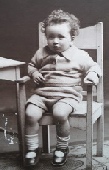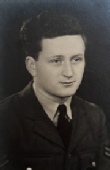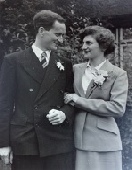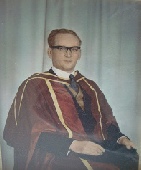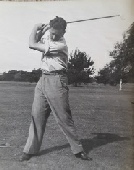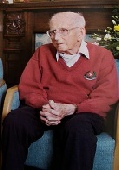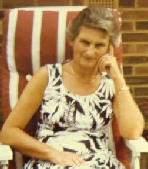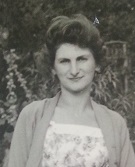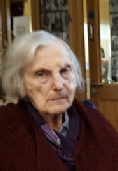Just before WW11
In the early part of 1939 preparations were made to evacuate school-children from London in the event of the outbreak of war. Also Mum and Dad became Naturalised British Subjects, On September the 2nd. 1939, the day before war was declared, Shirley and I were sent from London with Shirley's school. Mum took us to the local railway station at Clapton with our gas-masks in their cardboard boxes round our necks, name labels pinned to our lapels, and a change of clothes in a small suitcase. We boarded the train with the other children and waved good-bye to our parents. Neither they nor we knew where we were going or when we would see one another again.
We arrived at Bishop's Stortford station in Hertfordshire where we sat forlornly on our suitcases on the station platform waiting to be "sorted out", and were eventually taken to a school hall to await our prospective "foster-mothers". Shirley and I were taken, together with two of our friends, also sisters, by two widows Mrs. James and her sister Mrs. Cooper, to a thatched cottage in the heart of the countryside near Much Hadham. To us it seemed at the time to be a great adventure, for we had never been to the countryside before and we thought it was wonderful to have to go upstairs through a door with a latch to our bedrooms under the thatch with a candle in a candle-holder. I remember looking out of the open window after dark- it was a very warm September- and being amazed to see how dark it was, because of course there were no street lights. There was no running water in the cottage and no gas or electricity. Water had to be fetched from the pump outside, all the cooking was done on a small primus stove, and baths were taken in a tin bath in the living room. We used to walk to the village in the morning for the milk and papers, and we went to school across the fields and over the stile to the village school. It was soon realised by the authorities that they had delivered the wrong children to the wrong school, for the village school had no facilities for teaching Grammar School children as Mary Poirier (my friend) and I were, After a fortnight we were transferred to Bishop's Stortford, where Shirley and I were billeted on Mr. and Mrs, Turner, and Mary and I went to Harts and Essex Grammar school and Shirley and Doreen went to the local Primary school. We shared the school with the local children, and they went to school in the mornings whilst we went in the afternoons from 1 o'clock till 5p.m. It was here that we first tasted bacon and pork and sausages. and Mrs. Turner used to make a delicious steamed suet apple pudding on a Monday when she did the washing in a big stone boiler in the wash-house. I have since wondered if there was any connection between the two events. Could she have steamed the pudding in the boiler?
The winter of '39/40 was very cold with thick snow and Mr. Turner made us a toboggan which we used in a nearby hilly field, but in spite of their kindness we were very homesick, and used to write letters to Mum and Dad pleading to be taken home. They would come and see us from time to time, and once Barbara came on the train on a very snowy Sunday and when she left to go home she sang as she walked away, waving, "We'll meet again" a popular song of Vera Lyn's. She wore a grey-green coat trimmed with maroon fur at the collar and cuffs. Shirley and I cried bitterly at being left behind. A short time later, Mrs. Turner was taken ill with what we later discovered was a miscarriage, and her husband was called up. She felt she could not cope with us any longer and we were sent to stay with a couple who lived next to the church in the Stansted road.
Dr. Matthews was a psychiatrist who had lived in Hampstead, and he and his wife had two sons of their own, both of whom were away at boarding school. The younger of the two had a very inflated opinion of himself and his status in life. He suggested that we only went to stay in his house so that we could have chicken for dinner! He was very surprised when I replied indignantly that we had chicken every week at home! They employed an Austrian refugee called Martha as cook who told us of the terrible conditions she had left behind in Austria. She told how she and the other Jews had to wear yellow stars on their clothes to signify their race, and she had had to crawl in the road and lick the street with her tongue. She never explained how she made her escape. She was however a very inventive cook. I remember on one occasion when guests were expected to dinner. Shirley and I had to make ourselves scarce so we stayed in the kitchen and watched the preparations. Martha told us she was going to make fried eggs for supper. She made several small circular flat meringues in the centre of each of which she placed an upturned half-peach from a tin. They did indeed look like a plate of fried eggs! Food was not yet in short supply at this stage as we were only a few months into the war, although Ration Books and Identity cards had already been issued.
Dr. Matthews and his wife were very good to us and bought us lots of jig-saw puzzles including one of The Laughing Cavalier. Mrs. Matthews was surprised when I insisted on washing my own underwear. I used to do it at home and I couldn't see any reason not to do it there! They had lots of records of classical music and I must have already had an interest in it because I remember writing to John, who was by this time in Cambridge with his school, giving him a complete list of all the Beethoven's Sonatas which Dr. Matthews had on disc! We were probably happier in this billet than anywhere else so we were very sorry to hear that the Matthews were leaving the district and we would have to move on again. We were placed with a couple who had a stream running at the bottom of an enormous garden in Rye Street, A including a small orchard with lots of apple trees and blackcurrant bushes. Whenever I smell apples in store and blackcurrants I am reminded of those days. Our foster-father Mr Hunter was a keen amateur photographer and showed us his photographs including some of the Lake District and I was so impressed that I made up my mind that one day I would go there.
The coming of the end of the school year meant that we could go home for the summer holidays. The whole period we had been away later became known as the "phoney war" for very little had happened as far as lighting was concerned and all was quiet, so it was decided that there was no point in returning to Bishop's Stortford. Nobody anticipated what was to happen in September 1940.
During the War
On August 21st, two German bombers jettisoned their load of bombs on London, and in retaliation the R.A.F. bombed Berlin. Hitler threatened to flatten London, and on September 7th. 300 German bombers arrived over London at around 5 p.m., making for London Docks. Huge fires caused a great deal of damage and many people were killed. Nothing like this had ever been seen before. This was the first of the Air Raids on London and were repeated every night for more than two months, during which time 13,000 Londoners were killed, There was a few day's cessation of bombing over the Christmas period, and then on December 29th., a Sunday, the bombers came in the afternoon, just before 6 o'clock, and the City was set alight. At the beginning of 1941 the Air Raids became intermittent but on May 10th London was struck by the worst raid of all. During the whole of the Air Raids 30,000 Londoners were killed.
Every evening at about dusk the Air Raid Sirens would start wailing with a rising and falling tone and everyone would gather up blankets, hot drinks and candles and torches and make his way to the Anderson shelter which we shared with our neighbours, the Collins family, which was in their garden, and would prepare for the long night ahead. Blackie was put in the cellar as this was considered to be the safest place for her. We could not take her into the shelter with us as it was already overcrowded, and because she would have been able to run out had she wished, there being no door to the shelter. Inside the shelter we each had our own deck-chair. The shelter consisted of a semi-underground excavated area lined with corrugated iron and roofed over with a hoop-shaped piece of corrugated iron which was covered with earth and turves. A piece of sacking hung over the entrance. Soon after we had settled in, the familiar drone of enemy aircraft could be heard overhead whilst those brave enough to poke their heads out of the entrance could see the criss-crossing beams of searchlights roaming over the sky in search of the planes. At the same time the anti-aircraft guns (Ack-Ack) fired in the hope of bringing them down. We would sit huddled in the shelter waiting for the whine of falling bombs and the subsequent explosions. The German bombers unloaded their deadly cargo in a "stick"- several bombs in quick succession- so that we heard the whine-crump of the bombs one after the other, each one being a little nearer, or if we were lucky, further away. Sometimes the R.A.F. fighters -Hurricanes and Spitfires- would engage in a dog-fight in mid-air, wheeling and roaring all over the sky.
On one such night we heard the whine and crump of a very close explosion, and suddenly Blackie came leaping down into the shelter, whining and shivering with fear. We were all horrified because we thought she would have been unable to get through the doors of the cellar and the house unless the house itself had been hit. Bombs were still failing all around so we were unable to see what had happened until dawn when the "All-Clear" siren sounded and we emerged from the shelter to go home. Much to our relief the house was still standing and we realised that the force of the explosion had thrown open all the doors. In the street we could see incendiary fires burning in houses in neighbouring streets and a red glow in the sky which we later heard was due to heavy bombing and fires in the East End, The air raids went on night after night for many weeks and the only sleep we were able to get was at dawn when we fell exhausted into bed, This episode of the war was known as The Battle of Britain, and it affected London and the South-East. Thousands of people were killed by high-explosive incendiary bombs and vast areas of London were destroyed.
On day Barbara, Shirley and I pooled our sweet rations and bought a small Toblerone to eat in the shelter. In the dark, Barbara told us a story, and when she had finished we asked her for our share of the Toblerone only to find that she had "absent-mindedly" scoffed the lot. We never forgave her for that!
We must, have gone back to school in Bishop's Stortford for at least one more term, because I remember returning home for the holidays to find that Blackie had been put down because she was so terrified of the Air Raids, and also because we were soon to be on the move again. I was heartbroken and lay on my bed and sobbed for what seemed like hours.
Jack and Joe had been called up into the Army and R.A.F. respectively. Joe was a P.T. Instructor and was stationed in various parts of the country including Filey in Yorkshire, and in the Isle of Man, so that Kit was able to move around Britain to be with him. Jack, however, was very soon drafted overseas to Italy and North Africa and Het moved back to Clapton with the rest of the family.

